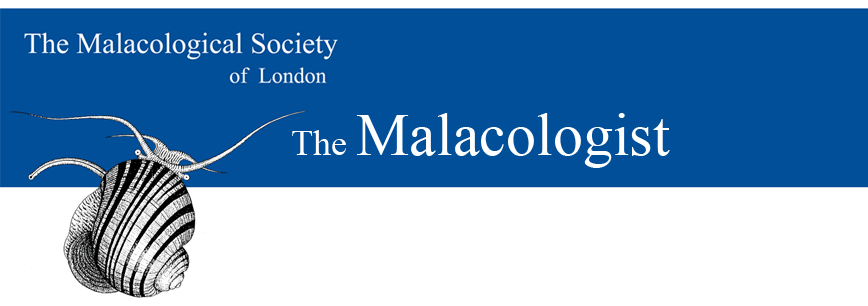

Of snails and other insects
Meeting organisers have a stressful time—particularly when the
call for papers goes out and you wait, knowing that for many academics
a deadline is the date on which to start thinking about something. We
don’t have a deadline for the Molluscan Forum, and last year’s
event was the largest ever, while the year before was touch-and-go.
This issue has stretched to 28 pages to accommodate all the abstracts,
and two delayed research grant reports, as well as the normal contents
of a February issue. The Forum abstracts display the wide variety of
research activities involving molluscs, from comparative anatomy, speciation,
systematics and phylogeny through population dynamics and ecology (including
palaeoecology), via parasitology, immunology, behaviour and physiology,
to pollution , conservation and economics, taking in culture techniques
and museum curation on the way.
While this celebration of molluscan biology shows how invertebrate biology
can enthrall new researchers, the potential opportunities that invertebrates
offer for research have to be made apparent. That is why the current
British schools’ biology curricula is worrying, with their scant
attention to non-mammalian biology. (The ‘A’ level Biology
specifications for a major examination board can be seen at www.aqa.org.uk/qual/pdf/AQA-5411-6411-5413-6413-W-SP-06.pdf.)
Hopefully, ventures such as the Education Awards and Buglife will help
redress the balance, so that phrases such as that used for the title
of this piece will turn up less commonly in University exam answers.
I am grateful to everyone who has contributed material for inclusion
in this issue. Please send contributions for the next (August) issue
to me by mid-July. Contributions of articles, brief reviews, and news
items (including items from non-malacological journals) are especially
welcome.
Please keep articles and abstracts simple and succinct - ‘as short
as possible but as long as necessary’ - avoiding or explaining
specialist terms. Where appropriate, include a reference to a more detailed
account, and an illustration. Please make the content of emails clear
in the header, or I may delete them unread as ‘spam’.
Bill Bailey
Dr S E R Bailey
Faculty of Life Sciences,
3.614 Stopford Building,
The University of Manchester,
Oxford Rd, Manchester M13 9PT, UK.
Email: bill...@manchester.ac.uk
Home Tel: 0161 962 2573.